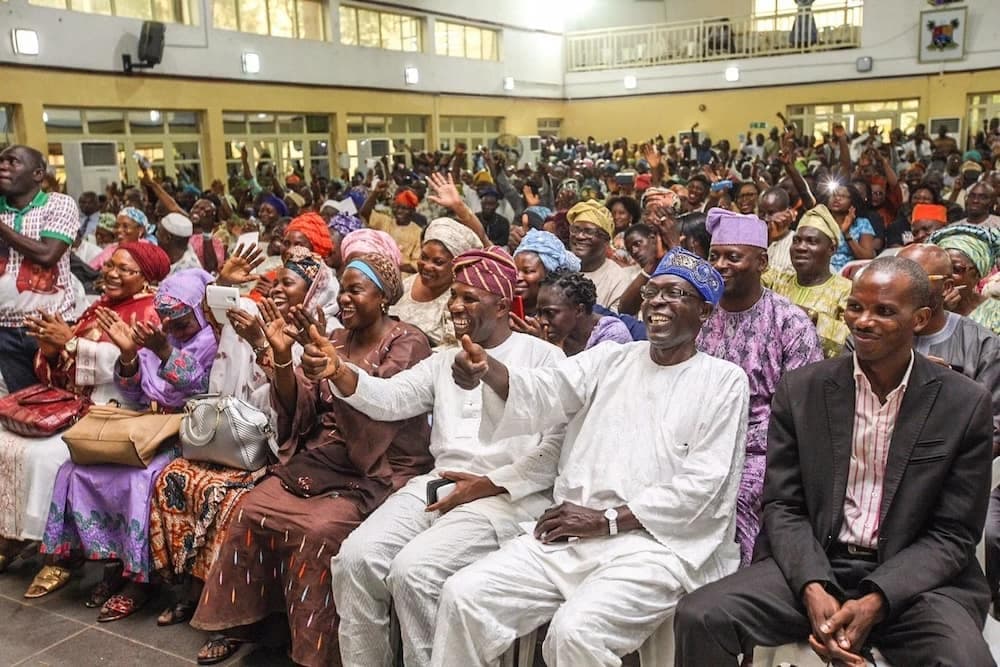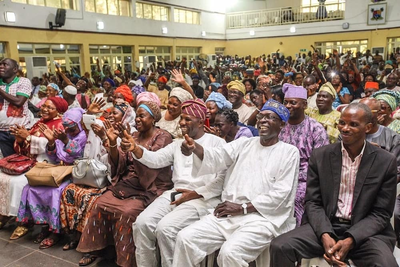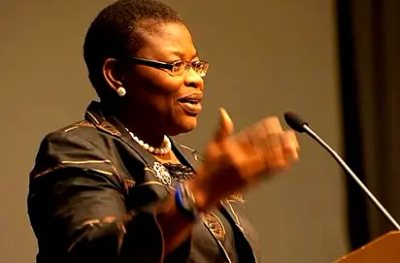Reflections on The Centenary of The Nigerian Civil Service by Tunji Olaopa (Read from Source)
The centenary of the founding of the Nigerian state is something to be celebrated. But more than that, it calls for deep and profound reflection for the simple reason that a hundred years is a life time. Whatever may be the shades of opinions on the preparation for the celebration of this event, no one will doubt its momentous nature. There is therefore the urgent need to insert reflective thought into the celebrations. James Baldwin gives us a critical insight: ‘There is never a time in the future in which we will work out our salvation. The challenge is in the moment, the time is always now.’
When the Northern and Southern Protectorates were amalgamated by Lord Lugard in 1914, he could not have been aware of the century long socio-political and economic implications of creating a plural state that is constantly threatened by centrifugal forces of ethnicity, religion and bad political economy. For the forty six years preceding Nigeria’s independence, the nascent state was rigged with several implosive landmines and less-than-nationalist colonial calculations that, in part, have had determinative effects on the fifty four years of independence. Nigeria has had, therefore, a hundred years of tragic solitude, to parody the title of Gabriel Garcia Marquez’s widely acclaimed novel. Like the novel and its protagonist’s founding of the city of Macondo, the metaphoric Colombia, Nigeria‘s founding owed a lot to the ‘colonial ingenuity’ of a couple. However, unlike Jose Arcadio Buendia and Ursula Iguaran, Lugard and Flora Shawn had no utopic desires for Nigeria. In spite of the utopic intentions of Buendia, Macondo is still very much like Nigeria in the series of misfortunes and turmoil, within and without, which ravaged the city. And furthermore, just as Macondo’s future was determined by the deciphering of a code that several generations of the Buendia family failed to decode, Nigeria’s fortune, I believe, hangs on our capacity to come to term with our colonial founding and postcolonial maturation.
The code that must be deciphered and interpreted to forecast the path of national development for Nigeria is the institution of the civil service as the machinery of government. The civil service system in Nigeria is the only institution that has the badge of continuity linking us to the past and the future. Apart from being the best that could be salvaged from the ambivalent legacies of the colonialists, the civil service system constitutes the focal point of any attempt to redeem the next hundred years of postcolonial and post-independence existence for Nigeria. My hypothesis: the salvation of national integration and development lies with a rejuvenated institution which has been rethought to surpass the logic of colonialism and the limitations of post-independence.
It does not take serious reflection to agree with Thomas Taylor Meadows’ conclusion on the glory of China: ‘the long duration of the Chinese empire is solely and altogether owing to the good government which consists in the advancement of men of talent and merit’ in the civil service system. Meadows’ observation was made in 1847 when he was the British Consul in Guangzhou. By 1853, William Gladstone, the Chancellor of the Exchequer, reckoned with Meadows’ recommendations and commissioned Stafford Northcote and Charles Trevelyan to investigate the dynamics of founding a good government on the operations of an efficient and effective civil service. The Northcote-Trevelyan Report of 1854 has since become the template for a modern civil service institution around which any state can ever hope to make progress through administrative facilitation of the production and distribution of public goods and services to the populace. And democracy brings its own progressive assumptions into the dynamics of the administrative competence of any state.
Since its ambivalent founding in 1954, the Nigerian civil service has had enough time to make a full cyclic transition from evolution to growth and reformulation of its founding essence since 1914 to date. The civil service system in Nigeria owes its existence and evolution to series of constitutional and administrative necessities. The year 1954 is very significant in Nigeria administrative history because it signals the formal establishment of a civil service structure with a truly Nigerian framework. Before this period, the civil service in Nigeria was strictly a colonial affair. The colonial administrative machinery was narrowly focused to handle the state function which was basically the maintenance of law and order. The strategy for carrying out that function was essentially through an arrangement which not only excluded the colonised personnel but also facilitated the exploitation of the colonies. Thus, from 1934 to 1954, seven commissions and committees became the precursor to what would become the Nigerian civil service: Hunt Committee (1934), the Bridges Committee (1942), the Tudor-Davies Commission (1945), the Harragin Commission (1946), the Smaller Commission (1946), the Foot Commission (1948), and the Phillipson-Adebo Commission (1953).
The evolution of the Nigerian character of the civil service reached its culmination in the post-1954 period with series of reforms that constituted the beginning of the institution of the civil service system in Nigeria. Thus, from 1954, the civil service became the centre of furious and progressive reforms meant to ensure that the evolution of the system would transform it into an adequate institution around which the nascent post-independence state would become true to its stated ideals of providing basic amenities to the Nigerian masses who endured the horrors of colonial administration and its exploitative logic. The Gorsuch Commission (1955), for instance, became significant for confronting from the beginning the hierarchical structure of the colonial arrangement, especially as it differentiates between the ‘generalists’ and the ‘professionals’. In a sense, the professionalization angle to the reform of the Nigerian civil service took its root from Gorsuch.
Newns Commission (1959) took that reform initiative further with the establishment of a Westminster model organisational framework compatible with a ministerial form of government. This was achieved through the integration of departments with the ministries through the grafting of the ministerial structures on the departmental structure of the colonial service. One fall out of this was the creation of the post of the permanent secretary to whom the Minister could direct all decisional problems. These reform initiatives were progressive but not definitive. The Newns recommendations, for example, have endured with the civil service system in Nigeria to date, yet we cannot say the civil service has made historic advances that ought to transform the dynamics of governance in Nigeria. And another century of nationhood looms ahead of us.
The Nigerian civil service was born in tentative hope that it would eventually acquire the capacities and competencies to drive the engine of socioeconomic growth in Nigeria as long as the state endures. No state in the world has any other hope of deliverance. In a century, Nigeria has made valiant effort at evolving a good governance paradigm that would bring the people into a democratic relationship with the state. However, in a century, we have not yet arrived. According to Henry Hampton, ‘What drive people to the public service is a sense of possibility.’ The possibility is that of making impacts that would last a century. Herein is the mandate of the Nigerian Government: the belief in the possibility of building an impactful civil service that would endure for another century, and the political will to lay its foundation. The first condition of such a mandate is however to rethink the historical dynamics that has constricted and determined the evolution of the institution.
We have so far been examining how the Nigerian civil service began its centennial evolution from the colonial administrative logic which was initially meant to facilitate the exploitation of the colonies. From the perspective of hindsight, the history and the evolution of the Nigerian civil service constitute the sum total of an outstanding starts; evolving, immature and weak structures, ambivalent decisions, bold steps, compromised reforms and fortuitous breakthroughs. The Nigerian civil service has passed through the eye of the storm on its march to greatness. Yet it has not arrived at its mandated destination. Taking the historic hindsight further, we proceed to examine some dynamics of misses and losses that intervened in the evolutionary progression of the Nigerian civil services and, in some senses, short-circuited its early success, especially in the immediate post-independence period.
When the Nigerianisation Policy was launched, its intention was to put the nascent civil service in Nigeria on a trajectory that would facilitate a smooth and efficient transformation of government policies into noticeable infrastructural and socioeconomic goods that the citizens can identify with. Or, ask Norman Tebbit, how can people be governed by those who do not speak their language? The language of the people is the language of good governance and the machinery that enables that language is the civil service system in any state. Thus, the Nigerianisation Policy was intended to redefine the colonial administrative system in such a manner that its language would be clear and meaningful to Nigerians.
The first snag to this worthy governance intention was the unintended clash between the administrative principles of representativeness and efficiency with regard to the placement of Nigerians who will replace the expatriates. The eventual subordination of merit to representation diminished the capacity the civil service required to facilitate socioeconomic growth and development. This was further complicated when the leadership of the civil service were seconded to the various regions. The secondment became, in the long run, a paradox. On the one hand, it further depleted the capacity quotient of the federal civil service to oversee and direct the administrative trajectory of Nigeria along the path demanded by post-independence expectations. On the other hand, it enabled the regions to achieve outstanding administrative success which, quite tragically, is what Nigeria is still attempting to recreate in terms of the multiplicity of genuine reforms
The essence of the success of the regional civil service, especially as demonstrated in the Southwest, is the one-to-one rapport between the political and the administrative leadership. This prescribed relationship constitutes the dynamic framework that activates the efficiency required to utilise manpower and implement policies. This relationship would be moderated by a strict code of political accountability within which ministers would be accountable to the government and civil servants are expected to be apolitical and impartial while serving as confidential advisers to the ministers. This arrangement consolidates a politics-administration nexus that defines public administration today. Thus, between Chief Simeon Adebo and Chief Obafemi Awolowo, there developed a very strong and professional synergy that transformed the socioeconomic landscape of the Southwest. This outstanding success was also recorded in varying degrees in the Eastearn and Northern Regions. The visible infrastructural effects are still with us today. The Awolowo-Adebo model of administrative partnership demonstrates poignantly the truth of Peter Keen’s assertion that ‘complexity and trust go together.’ The Southwest administrative experiment, which is the most celebrated, teaches a simple lesson: to achieve governance requires unparalleled cooperative effort and political will that would turn policies into wonders of effective execution.
If the essence of the lesson had been imbibed, it would have been enough to change the contour of our centenary as a nation. The story would have been qualitatively different today. We have been attempting to relearn the simple lesson of the Awolowo-Adebo experiment since independence. And progress has been excruciatingly slow as genuine reform initiatives have been punctured by political misadventures, global hiccups and national reversals. For instance, the hope of ever getting the Nigerian civil service on course was dashed with the advent of military intervention in politics in 1966. It is quite unfortunate that some of the most genuine and promising reforms were initiated during the long period of military executives.
Let us consider first the attempt by Adebo and Udoji to domesticate the essence of the Fulton Report within the Nigerian administrative context. This 1968 Report was an urgent attempt to bring the civil service into the twentieth century within the strategic demand for professionalism and managerial competence in public administration. The Nigerian civil service had been operating within the originating framework of the Northcote-Trevelyan administrative dynamics, itself rooted in Max Weber classic bureaucratic model. Yet post-independence and its governance imperative demands more in term of skills and capacities. In 1971, the Adebo Commission was the first to confront the deep managerial issues in the organisation and structure of the civil service (outside of its mandate of wages and salary). At this juncture, the military had already initiated a ‘new federalism’ that placed the government solely at the ‘commanding height’ of the Nigerian political administration, and characterised by increased centralisation of political authority, ascendancy of federating forces, greater structural differentiation of the constituent states, and expansion of the policy-making and execution functions of the Federal level.
The Udoji Commission of 1974, recommended by Adebo, clearly clarified the deep intent and imperative of the Fulton Report as well as the fundamental challenge of the Nigerian civil service, which it considered to be inability to respond to and internalise global best practices that can be appropriately deployed within the complexity of modern administration for development purposes. Specifically therefore, the Commission recommended wide ranging institutional reappraisal. Central to this reappraisal is a new style public service infused with ‘new blood’ working under a result-oriented management system rooted in project management praxis that is operated by professionals and specialists in particular fields. It also recommended the standardization of conditions of service, increase in public sector wages, a unified and integrated administrative structure, the elimination of inefficient departments.
Unfortunately, the deeper implications of the Udoji Commission Report were jettisoned for the implementation of its wages component. And the Nigerian civil service lost its second transformatory moment. What followed was the acute breakdown of democratic governance tradition under the debilitating command structure of the military as well as several reform attempts to arrest the gradual but steady degeneration of administrative structures. When the 1975 purge of the civil service happened, it represented the climax of the erosion of the essential capacity of the civil service system in Nigeria. The structural adjustment programme of the early 80s then became the last act in an administrative drama that ensured that a very strong colonial legacy turned into a shadow of itself, without capacity or competence. From the 90s onward, there followed serious reform agenda saddled with the task of making sense of the challenges of the Nigerian civil service and how the rot can be arrested.
Yet, the foundation of the lacklustre performance of the civil service had already been laid, and the status of the Nigerian centenary had already been decided. The best we can do is to look forward to another centenary of achievements on a better foundation. ‘The important things of tomorrow,’ says Andrew Grove, ‘are probably going to be things that are overlooked today.’ So, our redemption is to look forward to tomorrow with a willingness to reappraise yesterday so that we can recover all that we left behind.
Our centennial historical excursion so far, has been a sober reflection on the evolution of the Nigerian civil service within a progression beginning with the commencement of colonialism and down to the post-independence institutional operations of the civil service system. Unfortunately, the hindsight of evolution could only furnish us with a long litany of what could have been but were not. In other words, the future of the Nigerian civil service still needed to be rescued from the realm of possibility into that of administrative actuality of capacities and competences that would activate a professional unfolding into a world class institution capable of efficiently and effectively providing the service delivery of public goods to Nigerians.
For Richard Hooker, the English theologian, ‘Change is not made without inconvenience, even from worse to better.’ Transforming the Nigerian civil service is the only foreseeable mandate worth considering if the next centenary would constitute a huge dossier of administrative achievements within the overall dynamics of nation building and national development in Nigeria. A functional and professional civil service system in Nigeria is still possible. And, as we highlighted in the second part of the serial, that possibility had been amply demonstrated in the regional governance framework that brought administrators and politicians together in a synergy never before witnessed in the history of Nigeria. We cannot therefore abandon the future; rather, the civil service in Nigeria need to step into its true history: ‘the coming into being, the bringing forth of the new,’ according to Herbert Aptheker. How do we activate this true history?
I will suggest that we make effort to retrieve the two transformatory moments that could have launched the Nigerian civil service on the path of institutional consolidation after its colonial evolution. The first moment was defined around the inability of the federal civil service to tap into the wealth of administrative competence and experience represented by Adebo, Udoji, Akilu and others who were the beneficiaries of a civil service system dedicated to professionalism and service. The Federal Government’s loss was the regional government’s gain. The second transformatory moment was defined by the Adebo’s and Udoji’s recommendations that would have reconstituted the operational dynamics of the civil service along the managerial and performance-oriented framework that ensure continuous organisational learning that keeps the civil service abreast of current global best practices adapted to local exigencies.
Since the return to democratic governance in 1999, there has been serious and genuine attempts to come to term finally with our administrative dilemma and jumpstart real reforms strong and committed enough to redirect the trajectory of service delivery on behalf of the Nigerian citizens. The three programmes of civil service institutional renewal since 1999—the Obasanjo Civil Service Renewal Programme, the Yar’Adua public sector reform and the current Jonathan Transformation Agenda—all have the objective of transforming the civil service into ‘a world class institution for the efficient and effective execution of government policies and programmes with professionalism, excellence and passion.’ This objective is captured in the irreducible reform blueprint titled National Strategy on Public Service Reform (NSPSR). The NSPSR is fundamental because it represents the first time in a century that the objective of civil service renewal would be captured in figures, charts, projections and genuineness. We can say that, with the NSPSR reform blueprint, Nigeria has already made a very solid institutional commitment to the century.
The first condition for the success of reform is, surprisingly, passion, the express statement of the enthusiasm that one is ready to commit into the enterprise of organisational transformation. It is this combination of enthusiasm and commitment that gives any project its first animating force. If reform must persists through its many complex phases, then it requires a statement of intent like the one provided in the NSPSR document outlining where we are and where we intend to be; it is a commitment to the next century of the Nigerian civil service. Such a document commits Nigeria to fighting in her own cause rather than trusting the experience of others. ‘We seriously undervalue the passion…a person brings to an enterprise. You can rent a brain, but you can’t rent a heart,’ says Mark McCormack.
The important point to note, especially with regard to the business of reform, is that those with the passion and commitment alone do not necessarily outperform everyone else. Rather, there must also be a will to push through to excellence. The complexity of reform is so vast that passion can fail. While commitment to the cause of reforming the civil service system in Nigeria can launch us into the next century, what is needed to sustain and make a success of the hundred years is will and resolution.
Let us reconsider the essence of the two transformatory moments we are attempting to recover for the next centennial of the Nigerian civil service. First, Chief Simeon Adebo succeeded in the Southwest because he got the unflinching commitment and the political will of Chief Obafemi Awolowo. From the Awolowo-Adebo model, we learn the essential lesson that creative cooperation is the soul of reform success. And, for Nancy Kline, ‘Synergy takes place best in structure.’ The politics-administration dichotomy is founded on the necessity of the political and administrative leadership combining their strength towards administering and achieving service delivery that will humanise and deeply satisfy the public. Arriving at an adequate dynamics of good governance goes beyond the politics of policy making; it requires the unique administrative inputs that will make explicit the trajectory of execution and the best way to achieve it. This was what Adebo achieved for Awolowo in the regional civil service of the Southwest. When the Action Group declared its slogan to be ‘Life More Abundant,’ it was not just paying lip service to a biblical statement. Rather, it was a call to service, to ‘work more abundant’ between the politicians and the administrators, as Adebo testified.
The essence of the second transformatory moment that must be recovered for the next centennial of the Nigerian civil service is the urgent need to put in place a system of new professionals who are willing and ready to engage the dynamics and demands of a performance-oriented civil service system. The managerial imperative behind the Fulton Report which Udoji recommended is a call to public service and organisational performance. This managerial imperative asks a fundamental question that drives the execution of reform objectives: How do we undercut organisational complexity to increase performance and efficient service delivery? Performance management is the framework by which we connect our reform enthusiasm with reform objectives; it gives strategic direction to reform trajectory through channelling the capacities and competences of the civil service professionals. The dynamics of performance requires that data on performance be regularly published to enable benchmarking. This will not only allow the public officials to judge their work vis-à-vis others, it will also allow the public to understand and assess what they are paying for.
To step solidly into the future, therefore, requires that we should annex to the NSPSR document (a) a viable model of politics-administration synergy that can adequately confront the complexity of reform; and (b) generate a performance management framework that can utilise the capacities in pursuit of effective service delivery. The last century is gone, and we can no longer cry over spilt milk. The next century is what we must re-envision and energise. ‘Great ideas,’ says C. D. Jackson, ‘need landing gear as well as wings.’ The transformation of the Nigerian civil service for the next century needs more.






